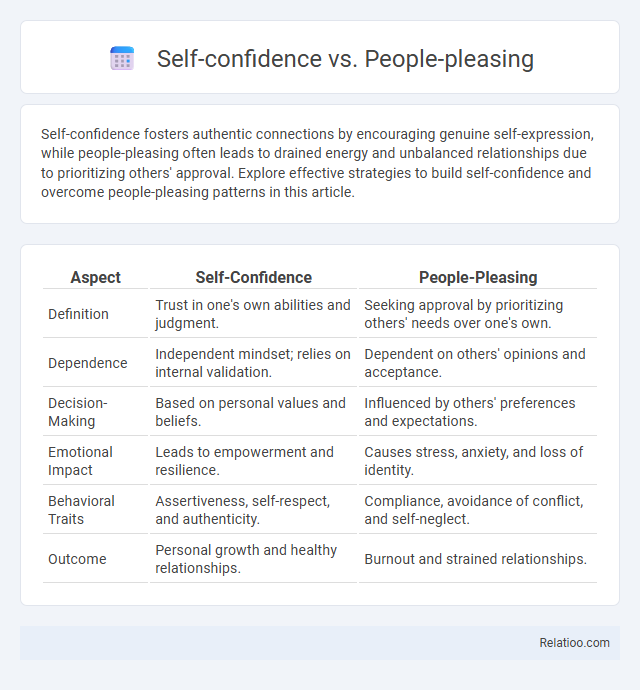Self-confidence fosters authentic connections by encouraging genuine self-expression, while people-pleasing often leads to drained energy and unbalanced relationships due to prioritizing others' approval. Explore effective strategies to build self-confidence and overcome people-pleasing patterns in this article.
Table of Comparison
| Aspect | Self-Confidence | People-Pleasing |
|---|---|---|
| Definition | Trust in one's own abilities and judgment. | Seeking approval by prioritizing others' needs over one's own. |
| Dependence | Independent mindset; relies on internal validation. | Dependent on others' opinions and acceptance. |
| Decision-Making | Based on personal values and beliefs. | Influenced by others' preferences and expectations. |
| Emotional Impact | Leads to empowerment and resilience. | Causes stress, anxiety, and loss of identity. |
| Behavioral Traits | Assertiveness, self-respect, and authenticity. | Compliance, avoidance of conflict, and self-neglect. |
| Outcome | Personal growth and healthy relationships. | Burnout and strained relationships. |
Understanding Self-Confidence: Core Traits and Benefits
Self-confidence stems from a deep sense of self-validation, empowering individuals to trust their abilities and make decisions without reliance on external approval. Unlike people-pleasing, which prioritizes others' acceptance often at the expense of personal boundaries, self-confidence promotes authentic self-expression and resilience. Core traits include self-awareness, assertiveness, and emotional stability, which collectively foster improved mental health, stronger relationships, and enhanced goal achievement.
Defining People-Pleasing: Motivations and Patterns
People-pleasing involves consistently prioritizing others' needs and approval over Your own, driven by a fear of rejection or desire for acceptance. This behavior often stems from underlying low self-confidence, where external validation replaces internal self-validation as a measure of worth. Recognizing these patterns enables you to shift from dependence on others' opinions toward developing authentic self-confidence and genuine self-validation.
The Psychology Behind Self-Confidence
Self-confidence stems from an intrinsic belief in your abilities and worth, differing significantly from people-pleasing, which relies on external approval. Psychological research highlights that self-validation plays a crucial role in cultivating genuine self-confidence by encouraging internal affirmation rather than seeking validation from others. Understanding this dynamic empowers you to foster a healthier self-image and resist the need to constantly appease those around you.
Root Causes of People-Pleasing Behavior
People-pleasing behavior often stems from deep-rooted fears of rejection and low self-worth, where individuals seek external approval to fill internal validation gaps. Childhood experiences, such as conditional love or overly critical environments, play a significant role in shaping the compulsion to constantly please others at the expense of self-confidence. Unlike genuine self-validation, people-pleasing is driven by anxiety and the desire to avoid conflict, undermining authentic self-esteem development.
Self-Confidence vs People-Pleasing: Key Differences
Self-confidence stems from a genuine belief in your own abilities and values, allowing you to make decisions based on self-assurance rather than external approval. People-pleasing involves prioritizing others' expectations to gain acceptance, often at the cost of your own needs and authenticity. Understanding these distinctions helps you cultivate self-validation, where your sense of worth comes internally rather than through external validation.
The Impact on Mental Health and Well-Being
Self-confidence enhances mental health by fostering resilience and promoting a positive self-image, while people-pleasing often leads to anxiety and diminished self-worth due to an overreliance on external approval. Self-validation supports emotional well-being by encouraging individuals to acknowledge their own feelings and experiences without undue dependence on others' opinions. Balancing these elements is crucial for maintaining psychological stability and overall well-being.
How Self-Confidence Fosters Authentic Relationships
Self-confidence promotes authentic relationships by encouraging individuals to express their true thoughts and feelings without fear of judgment, fostering genuine connections based on mutual respect. Unlike people-pleasing, which often leads to superficial bonds driven by external approval, self-confidence allows for honest communication and boundary-setting, essential for trust and emotional intimacy. Self-validation further strengthens these relationships by reinforcing inner worth, reducing dependence on others' opinions and creating a foundation for meaningful, balanced interactions.
The Hidden Costs of People-Pleasing in Everyday Life
People-pleasing often stems from a lack of self-confidence and the need for external validation, leading individuals to prioritize others' approval over their own well-being. This behavior can result in emotional exhaustion, increased anxiety, and diminished self-worth as personal boundaries are consistently compromised. Over time, reliance on people-pleasing undermines authentic self-validation, hindering personal growth and genuine self-esteem development.
Strategies to Shift from People-Pleasing to Self-Confidence
Shifting from people-pleasing to self-confidence involves setting clear personal boundaries and practicing assertiveness in decision-making to prioritize one's own values and needs. Developing self-validation techniques, such as recognizing personal achievements and internalizing positive feedback, strengthens intrinsic worth independent of external approval. Consistent reflection on one's motivations helps reduce reliance on others' validation, fostering authentic self-assurance and reducing the urge to conform.
Building Lasting Self-Confidence: Practical Tips and Resources
Building lasting self-confidence involves cultivating a strong sense of self-validation that is independent of others' approval, which contrasts sharply with people-pleasing behaviors that often undermine authentic self-worth. Practical strategies include setting personal boundaries, practicing self-compassion, and engaging in activities that reinforce intrinsic values and accomplishments. Resources such as cognitive-behavioral therapy techniques, mindfulness exercises, and supportive communities can facilitate the transition from external validation to enduring inner confidence.

Infographic: Self-confidence vs People-pleasing
 relatioo.com
relatioo.com